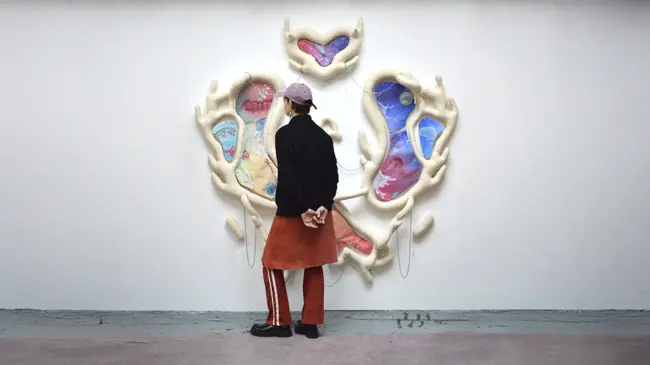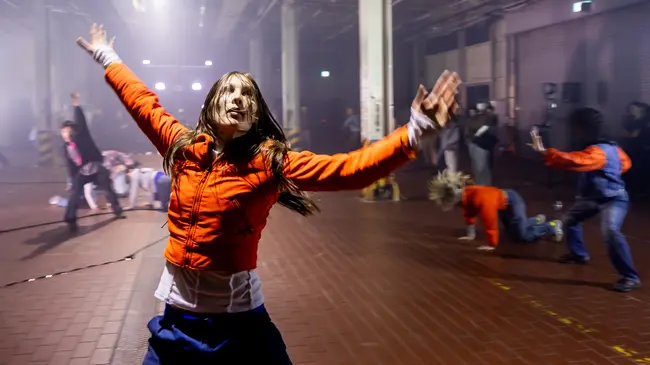Every person I’ve interviewed holds a special place in my heart

Looking for interesting profiles to feature isn’t the hardest part of our job, but it is particularly easy when they are sitting in front of you in the office. Meet our intern Dlisah Lapidus, who hopped on a plane from NYC to Ghent in September, and has become an indispensable asset to our team ever since. At 17, she is preparing for college in Ohio and curating her own magazine Junk Dump, while editing and interviewing for Different Class. As a young journalist in a big world, she’s led by her passion for activism, sustainability and art. The tables turn when she is the one being interviewed: we talked about her gap year and her experience at Different Class this past year.
How did you end up here in Ghent, and at Different Class?
I graduated high school a year early last year. I wanted to use that time to learn from hands-on experiences and grow both myself and the things I’m passionate about. I made this decision with the intention of taking a gap year to do an internship in journalism or art management. I wanted to use this extra time to learn from hands-on experiences and grow both myself and the things I’m passionate about. I started sending out applications for internships very randomly. I remember Herlinde, our editor-in-chief, responding to my application: 'Are you sure you wanna come to Ghent?' I pretty much just showed up in September, knowing nobody. I didn’t know what to expect at all, but it’s truly one of the best decisions I’ve ever made.
I spent a lot of time on the Google Maps live street view
What was your first impression of Ghent when you arrived here in September?
I remember the last week before I left home, I couldn’t imagine what my life here would look like. I spent a lot of time on the Google Maps live street view, virtually walking around this city. Eventually, I gave up trying to prepare myself, as you can never prepare for something like this sufficiently. It’s a very American observation, but when I got here, my first astonishment was that there were churches and castles and beautiful mediaeval buildings on a daily walk. I’ve always been pretty independent, and comfortable with loneliness, but I felt like I didn’t allow myself to be overwhelmed. The days after I arrived, I mostly just stayed at my place. I was scared to put myself out there; I didn’t even know where to start.
You did come out eventually and showed up at your internship. How were you able to let go of that fear?
I reminded myself that this was a learning experience. So when I finally did get out of this rut, I went to random cafes and restaurants completely alone. It took some time to be okay with spending time by myself... That was the first thing I learned here, and maybe the most important: how to be alone. I think I needed to know how to do that before I could open myself up.
You also co-founded an art magazine called Junk Dump. When did you develop your interest in print media and journalism?
I’ve always loved the physicality of books, the way content can exist, be translated and be shared in this space. When the pandemic started, I noticed I was not the only one who yearned for a connection to something tangible. In a digital world, I wanted to connect, promote, and teach young creatives through print media and an artistic community. I wanted to create a platform for artists to let their work exist in physical form. It was both a way for me to hold something literal and create something that I believe is important. A return to the senses.
Why do you want to curate?
I’ve always felt deeply connected to art, but I never quite knew how it fit into my life, or how I fit into the art world. For so long, I only wanted to tell my own stories. I thought only creative writing was the kind of writing that could be art. Something I’ve learned this year is that curating, editing and telling other people’s stories is art in itself.
How has your worldview changed since you moved to Ghent and started journalism?
I would say I communicate and interact with people in a different way now. I’m more okay with silence in conversations. I’m a rather shy person, but I’ve grown confident in my own approach to speaking and listening. The most important thing for me, in journalism and in life, is to make people comfortable and to facilitate interesting and genuine discussions. One of the best things about being a journalist, it sounds cheesy, is meeting such wonderful people. Every person I’ve interviewed holds a special place in my heart. Interviewing someone is such an intimate experience. I leave a lot of space for talking in interviews because the conversation is where the most interesting topics arise. I learn about things that never occurred to me. About love, society, emotions,...
What is one of your favourite memories from your year at Different Class?
I definitely have had many interviews that turned into such important conversations that I needed to hear at that moment. Interviews sometimes work as motivational speeches.
Interviews sometimes work as a motivational speech
I had this when I interviewed Anna Franziska Jäger and Nathan Ooms for their performance at Campo. Starting from a social media culture critique, we turned to a discussion on the post-internet brain in digital spheres. The way everything is constantly adapting and the anxiety that brings along. It was a conversation I had been having with myself for a few months.
This interview inspired me for the theme of the next Jump Dump magazine: Storage almost Full. It’s about the emotional capacity and how much we give away for digital existence. It’s about the intersection of digital and physical worlds, the simultaneous occurrence of analogue and hyper-digital trends and looking towards art for possible solutions.
What I’m really interested in is finding or creating a new platform where both the digital and physical can co-exist.
Different Class really triggered that interest: how it combines a publication, a promotional platform both digital and physical, and a membership for live culture that puts emphasis on that physicality.
What will the future bring for you?
I’m going to college, woo! I will study art administration and leadership at Oberlin college. I’m hopeful that I’ll have time to work on my own projects while I’m there. I plan to travel to a few countries in Asia and write about sustainable developments in clothing manufacturing companies, coming from a young person’s perspective. Sustainability is something I’ve always been very passionate about and I find that I’m comfortable travelling and being a little bit of an outsider. I can’t see a life where I’m not travelling.
I’m comfortable travelling and being a little bit of an outsider.
I’m also definitely going to continue working in art promotion for a very long time. I have a lot of ideas and projects that I am working on related to this. Promoting young artists, connecting people and creating new, accessible platforms for communication is my greatest passion. I don’t exactly know how I ended up in this field, but I think that’s what makes me so interested and challenged by it. This wasn’t a childhood pipe dream or some spontaneous decision, instead, all of the experiences I’ve had and the skills I’ve cultivated were able to mesh into something that constantly inspires and motivates me.
What’s something you’ll have to get used to again when returning to the US?
I am going to miss my life in Ghent so much! It is such a unique experience to be able to build a life for yourself at such a young age and I feel incredibly grateful for the opportunities I’ve been given, the kindness I’ve been shown and the lessons I’ve learned. Leaving it behind is more difficult than I expected.
Something that I struggle with is remembering that I worked hard for my achievements
Aside from that, It'll all be a bit weird, I think. I feel very lucky, I know there is a tremendous amount of privilege that has gone into being able to be here and go to college. Something that I struggle with is remembering that I worked hard for my achievements. It’s easy to just see it as sheer luck. College applications in the US are somewhat random: some kids get accepted into schools and some don’t, although they might have the same grades and experiences. I’m scared I’ll revert back to thinking everything is simply luck.
Lastly, you’re a big reader. Is there any book you’ve read this year that you want to recommend?
I’m a big David Sedaris fan, The Best of Me is the book that I read on the plane coming here. I’m also interested in female post-punk artist memoirs. I recommend Viv Albertine’s memoir Boys, Boys, Boys, Music music music, Clothes clothes clothes. It’s interesting to find overlaps and similarities when you read a few of these autobiographies.
Different Class works with the interest of their community at heart.
Our work’s purpose is to foster a solid network for independent artists, those who love them, and those who want to support them. Become a member to contribute to the local Belgian art scene.





